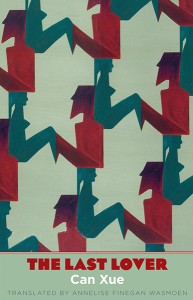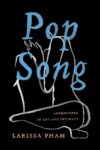 [Yale University Press; 2014]
[Yale University Press; 2014]
Tr. by Annelise Finegan Wasmoen
In Can Xue’s prickly and surreal novel The Last Lover, the reader encounters a dizzying array of characters who could all, in theory, be the titular last lover. The characters — pale-eyed businessmen, mystic wives, demonic corporate clients, a beautiful refugee girl with extremely long arms — are tossed around the book’s interconnected stories like colored beads in a kaleidoscope, all roiling with a sexual desire that seems to come out of some dark abyss, much like Can Xue’s writing itself. None of it makes sense: there are writhing snakes and screaming cooks, grotesquely swollen limbs and boys stung repeatedly by bees, and rosebushes that bloom, inexplicably, throughout the year. Yet listing these images does not accurately describe the way the novel unfolds as a performance unfolds; my writing them down will not make the novel happen as, when reading, it happens to you.
The Last Lover is not an easy read. But it is incandescent and engrossing if you are okay with losing your sense of self for a few hours. Here is how I experienced it.
Hour one: I sit in a coffee shop with a paperback copy and a cup of ginger tea. The prose is dense, peculiar. The characters are given to sudden declarations.
Hour two: I am astonished to realize that I have only read less than fifty pages.
Hour three: My head hurts. I feel like I have been translating. I have stopped tweeting.
Hour four: I succumb to the book. I let it carry me. My cup is empty. I do not question anything that happens in the novel: wolfish faces; floating couples; inexplicable transformations; the motif of heads separating from bodies and hovering there, as if still connected. Nor do I question the characters’ reactions, who take all of these surreal developments gamely, as they must, as we accept the eerie faces we sometimes see in the periphery of our vision.
Hour five: I sit up and feel as though I have emerged from dreaming. I look around myself surreptitiously, suspicious that the world has flipped over while I was reading. It seems impossible that I could crawl so deep within this novel and have everything remain the same. I feel betrayed. There is a scene in The Last Lover in which the characters enter a gambling city, which is both under- and aboveground. The tunnels underground are full of smoke, which all the residents of the gambling city are used to breathing. Where is my smoke? Where are my slot machines?
Hour ???: My thoughts are beginning to reflect the structure of Can Xue’s prose. That is, they are starting to disintegrate almost entirely. I catch myself thinking about the hectic flapping of bird wings. I dream about snakes wriggling and showing off their stripes. One character, spending the night on an enormous farm in some nonspecific jungle, dreams of fabulously horny snakes, of small amorous creatures slithering up his pants. The image remains in my memory on a kind of stretchy loop. I cannot even fathom desire as coming from any other place, though in The Last Lover desire seems to spring inexplicably from all kinds of places.
Throughout the novel the only constant sensation is that of sex: heavy, disorienting, thick as mud or syrup, wrapping around arms and legs. Well — there is also the energy that runs, alternatively electric and demonic, through the domestic spaces which populate the novel, strange interiors where cats walk around with bristling fur. The novel crackles with these odd undercurrents, which lie below the characters, their interactions, and any notion of plot, which is already worn thin by both the declarative nature of the dialogue and the surreality of its events. It feels very distinctly as though there are many novels beneath the surface of the novel, some too large and unborn to clearly describe.
Each character in The Last Lover seems arbitrarily named; it seems like they happen to be placed in the story according to convenience and each could be swapped out, depending on allegory. They behave as actors or dancers, given unto the roiling moods of the novel itself, and its unruly belly of desire. Perhaps The Last Lover is a deceptive title. I am not certain that there is any last lover, or any lover at all, or that the novel really ends and that there can be a last definitive anything. It’s still with me, in all its kaleidoscopic pieces, not entirely yielding to interpretation, like a puzzling dream one returns to again and again.
Larissa Pham is an artist and writer from the Pacific Northwest. She co-edits the blog at Full Stop.
This post may contain affiliate links.







